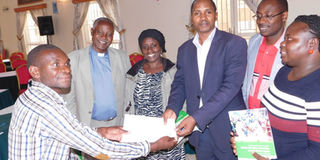Batwa demand affirmative action

Hand over. The Batwa leader from Rubanda District, Mr Gad Semajere (left), presents a copy of the Batwa grievances to the assistant commissioner in the Ministry of Gender Labour and Social Development, Mr Innocent Byaruhanga (centre), as other Batwa leaders and NGO partners look on in Kabale Town on Monday. PHOTO BY ROBERT MUHEREZA
What you need to know:
- The deputy executive director of Cross-Cultural Foundation of Uganda, Ms Barbra Babwetera, asked the Batwa to keep lobbying for government support in order to safeguard their culture.
- The assistant commissioner in the Ministry of Gender Labour and Social Development, Mr Innocent Byaruhanga, said government has plans of addressing the concerns of Batwa people.
Batwa leaders have asked government to establish affirmative action for its people to be involved in all community development projects so that they don’t compete for services with other community members who are well off.
“We appeal to government to provide affirmative action in education, health, operation wealth creation, leadership at local and national levels because we are not as privileged as the rest of the community members,” Ms Sylivia Kukunda, the leader of the Batwa in Kanungu District, said on Monday.
She added: “We need special offers where we don’t have to compete with the non-Batwa. Like there are positions for youth and women leaders that are not competed for by other categories of people, the Batwa should also have such special allocations, including for university scholarships.”
Ms Kukunda was speaking at a one-day dialogue for Batwa leaders from western Uganda organised by Cross- Cultural Foundation Uganda.
Mr Geoffrey Nzito, the leader of Batwa in Bundibugyo District, said: “It is the non-governmental oganisations (NGOs) that are helping us to earn a living, government neglected us after chasing us away from the forests where we lived before they were turned into National parks and forest reserves.
“If the government claims that it is helping us to develop through its programmes of poverty eradication and universal primary and secondary education, let it first buy for us land that is equal to the one we had in the 1990s.”
Mr Gad Semajere, the leader of Batwa in Rubanda District, said the Batwa should directly access government employment without being subjected to competition with other Ugandans who are “connected.”
“We have three Batwa graduates and it is our wish that government gives them jobs so that they can advocate our rights. We also need special seats in Parliament and local councils,” Mr Semajere said.
The LC3 chairperson for Kanyantorogo Sub-county in Kanungu, Mr James Kanyomozi, asked the Batwa to appreciate government for providing a conducive working environment for NGOs in their communities.
The deputy executive director of Cross-Cultural Foundation of Uganda, Ms Barbra Babwetera, asked the Batwa to keep lobbying for government support in order to safeguard their culture.
The assistant commissioner in the Ministry of Gender Labour and Social Development, Mr Innocent Byaruhanga, said government has plans of addressing the concerns of Batwa people.
“Government is aware of the pertinent issues affecting the Batwa and other indigenous groups. Issues of the right to practice, maintain and develop cultural customs and traditions, land alienation, right to self-determination, cultural, social and political discrimination, among others are being looked into,” Mr Byaruhanga said.
According to Mr Byaruhanga, there are more than 6,800 Batwa in Uganda and they live in the districts of Rubanda, Kisoro, Kanungu and Bundibugyo.




